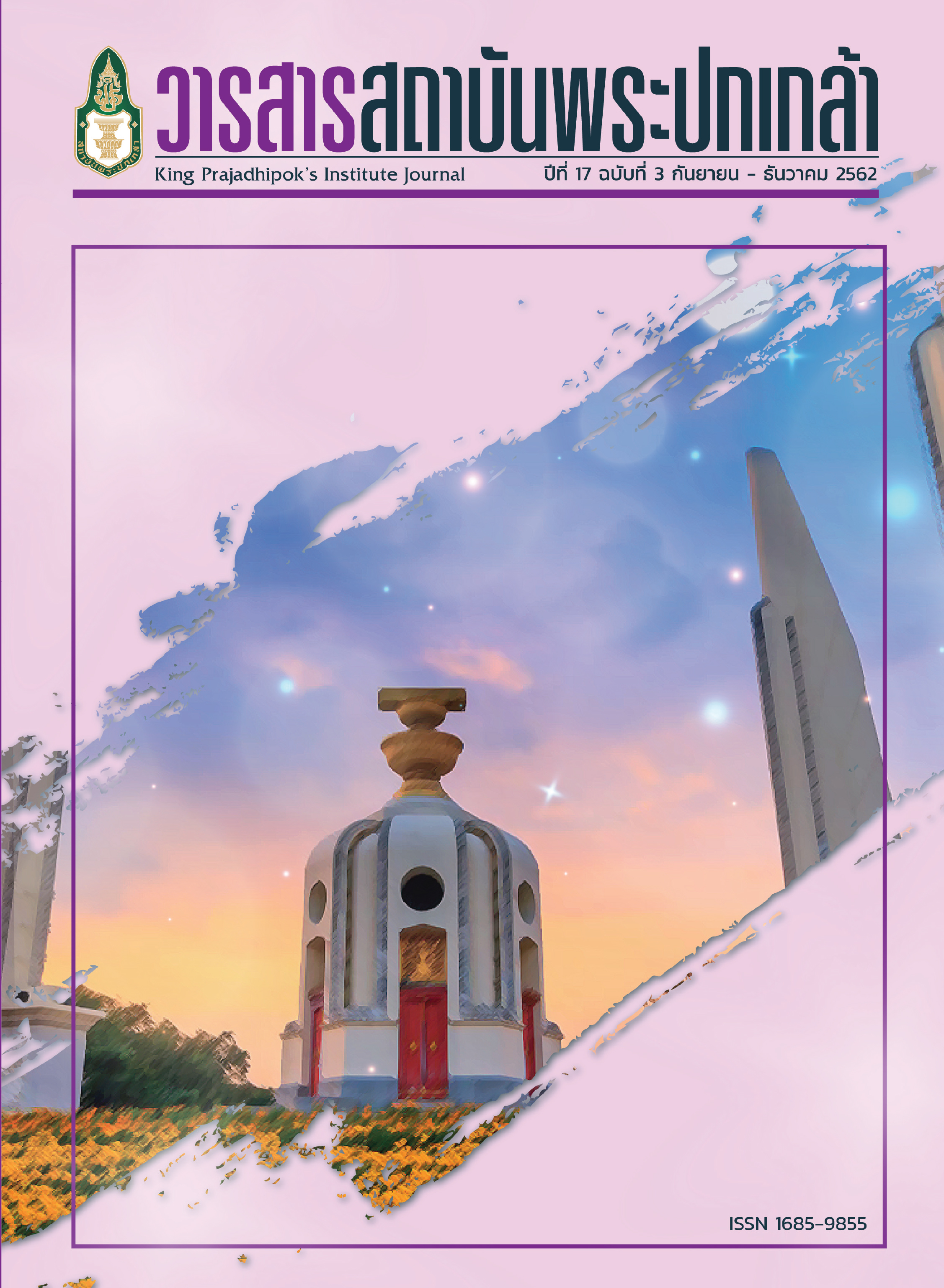The Function of the Constitutional Court in Safeguarding the Supremacy of the Constitution (1998-2014)
Main Article Content
Abstract
The purposes of this academic article were to examine the function of the Constitutional Court during 1998-2014. A detailed analysis of 677 decisions using the perspective of institutional interaction indicates that the Constitutional Court had adjudicated various constitutional disputes; namely a priori abstract constitutionality challenge, a posteriori abstract constitutionality challenge, constitutional question, jurisdictional dispute, constitutional interpretation, integrity of public office, and constitutionality of political party and related processes. The general conclusion is that the Constitutional Court has been essential to upholding the supremacy of the constitution.
Article Details
@ 2020 King Prajadhipok's Institute The Government Complex Commemorating All Right Reserved.
References
ชาย ไชยชิต. (2561). “ศาล” ใน ฐานะสถาบันทางการเมือง: มิติการศึกษาและทิศทางในการเมืองเปรียบเทียบ. วารสารสถาบันพระปกเกล้า, 16(2), 31-53.
ธนัย เกตวงกต. (2557). ศาลรัฐธรรมนูญในบริบททางการเมือง: ศึกษากรณีคำวินิจฉัย “คดีซุกหุ้น” (พ.ศ. 2544) กับคดีการเลือกตั้ง 2 เมษายน 2549. (วิทยานิพนธ์ปริญญามหาบัณฑิต) มหาวิทยาลัยธรรมศาสตร์, คณะรัฐศาสตร์, สาขาการปกครอง. กรุงเทพฯ.
ธีรยุทธ บุญมี. (2549). ตุลาการภิวัตน์. กรุงเทพฯ: วิญญูชน.
บวรศักดิ์ อุวรรณโณ. (2547). ศาลรัฐธรรมนูญกับบทบาทที่คาดหวังในการปฏิรูปการเมือง. ใน รวมบทความทางวิชาการของสำนักงานศาลรัฐธรรมนูญ ชุดที่ 3 : ศาลรัฐธรรมนูญกับการพัฒนาประชาธิปไตยในระบบนิติรัฐ (น. 55–72). กรุงเทพฯ: สำนักงานศาลรัฐธรรมนูญ.
พรชัย เทพปัญญา และคณะ. (2558). บทบาทของศาลรัฐธรรมนูญในการแก้ไขปัญหาความขัดแย้งทางการเมือง. กรุงเทพฯ: สถาบันพระปกเกล้า.
วิโรจน์ พลายแก้ว. (2552). การกำเนิดขึ้น อำนาจหน้าที่การพิจารณาคดีของศาลรัฐธรรมนูญ กรณีศึกษา “ไทยและเกาหลีใต้”. (วิทยานิพนธ์ปริญญามหาบัณฑิต) จุฬาลงกรณ์มหาวิทยาลัย, หลักสูตรสหวิทยาการเกาหลีศึกษา. กรุงเทพฯ.
วีระ สมบูรณ์. (2552). ตุลาการภิวัตน์กับประชาธิปไตย (รายงานการวิจัยฉบับสมบูรณ์). กรุงเทพฯ: คณะรัฐศาสตร์ จุฬาลงกรณ์มหาวิทยาลัย.
Brewer-Carías, A. R. (2011). Constitutional Courts as Positive Legislators: A Comparative Law Study. Cambridge: Cambridge University Press.
De Visser, M. (2014). Constitutional Review in Europe: A Comparative Analysis. Portland: Hart Publishing.
Dressel, B. (2012). Thailand: Judicialization of Politics or Politicization of the Judiciary?. In B.
Dressel (Eds.), The Judicialization of Politics in Asia. (pp. 79-97). New York: Routledge.
Dressel, B., & Khemthong Tonsakulrungruang. (2018). Coloured Judgements? The Work of the Thai Constitutional Court 1998-2016. Journal of Contemporary Asia, 49(1), 1-23. Retrieved from https://doi.org/10.1080/00472336.2018.1479879.
Ginsburg, T. (2005). Beyond Judicial Review: Ancillary Powers of Constitutional Courts. In T. Ginsburg & R. A. KaGan (Eds.), Institutions & Public Law: Comparative Approaches (pp. 225-244). New York: Peter Lang.
Ginsburg, T. (2009). Constitutional afterlife: The Continuing Impact of Thailand’s Post Political Constitution. International Journal of Constitutional Law, 7(1), 83-105.
Harding, A. (2010). The Constitutional Court of Thailand 1998-2006. A turbulent innovation. In A. Harding & P. Nicholson (Eds.), New Court in Asia (pp. 122-140). Oxford: Routledge.
Harding, A., & Leyland, P. (2009). Indonesia and Thailand: The Constitutional Courts of Thailand and Indonesia: Two Cases Studies from South East Asia. In A. Harding & P. Leyland (Eds.), Constitutional Courts: A Comparative Study (pp. 317-341). London: Wildy, Simmonds & Hill.
Hirschl, R. (2004). Towards Juristocracy: The Origins and Consequences of The New Constitutionalism. Massachusetts: Harvard University Press.
Jones, W. J., & Rhein, D. (2018). Hegemonic Preservation and Thailand’s Constitutional Crisis. The Romanian Journal of Society and Politics, 12 (2), 7-35.
Kelsen, H. (2012). Kelsen on the nature and development of constitutional adjudication. In L. Vinx (Eds.), The Guardian of the Constitution: Hans Kelsen and Carl Schmitt on the Limits of Constitutional Law (pp. 22 – 78). Cambridge: Cambridge University Press.
Khemthong Tonsakulrungruang. (2018). The Constitutional Court of Thailand: From Activism to Arbitrariness. In A. H. Chen & A. Harding (Eds.), Constitutional Courts in Asia (pp. 184-213). Cambridge: Cambridge University Press.
McCargo, D. (2003). Balancing the checks: Thailand’s paralysed politics post 1997. Journal of East Asian Studies, 3(1), 129-152.
McCargo, D. (2008). Thailand. State of anxiety. In D. Singh & T. M. Than (Eds.), Southeast Asian Affairs 2008 (pp. 333-356). Singapore: Institute of South East Asian Studies.
McCargo, D. (2014). Competing Notions of Judicialization in Thailand. Contemporary Southeast Asia, 36(3), 417-441.
Mérieau, E. (2016). Thailand’s Deep State, royal power and the Constitutional Court (1997-2015). Journal of Contemporary Asia, 46(3), 445-466.
Ockey, J. (2009). Thailand in 2008: Democracy and street politics. In D. Singh (Ed.), Southeast Asia Affairs (pp. 315-333). Singapore: Institute of South East Asian Studies.
Panthip Pruksacholavit & Garoupa, N. (2016). Patterns of Judicial Behavior in the Thai Constitutional Court, 2008–2014: An Empirical Approach. Asian Pacific Law Review, 24(1), 16–35.
Roznai, Y. (2017). Unconstitutional Constitutional Amendments: The Limits of Amendment Powers. Oxford: Oxford University Press.
Stone Sweet, A. (2000). Governing with Judges: Constitutional Politics in Europe. Oxford: Oxford University Press.
Stone Sweet, A. (2011). Constitutions and Judicial Power. In D. Caramani (Eds.), Comparative Politics (pp. 163-180). New York: Oxford University Press.
Yap, P. J. (2017). Courts and Democracies in Asia. Cambridge: Cambridge University Press.


